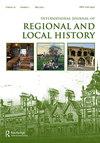不走走过场:七橡树,污水和无私的野心,1871-1882
Q2 Arts and Humanities
International Journal of Regional and Local History
Pub Date : 2014-11-01
DOI:10.1179/2051453014Z.00000000020
引用次数: 1
摘要
这个维多利亚时代的城市的卫生状况得到了很好的研究,但很少或根本没有关注小城镇,尽管那里的条件几乎同样令人不快。这个关于肯特郡塞文奥克斯的案例研究,主要利用报纸报道来追溯解决污水问题的漫长而充满争议的过程。一些现有的城市卫生史学是相关的,但其他三个因素在塞文奥克斯很重要。首先是地方委员会的出现,其次,它提供了一个制度平台,让地方“进步”政治家詹姆斯·格尔曼少校能够展示其强大的领导能力和强大的政治技巧,从而战胜他的“经济学家”对手。他的方法是详细的,以及他与同时代的自由主义者约瑟夫·张伯伦之间的相似之处。然而,塞文奥克斯纳税人的政治力量如此强大,以至于第三个因素——历史学家没有认识到的——是地方报纸在形成地方舆论和防止经济学家破坏进步议程方面所发挥的作用。本文章由计算机程序翻译,如有差异,请以英文原文为准。
Not Going through the Motions: Sevenoaks, Sewage and Selfless Ambition, 1871–1882
Abstract Sanitary improvement in the Victorian city has been well researched, but little or no attention has been paid to smaller towns, though conditions there could be almost as unpleasant. This case study of Sevenoaks, in Kent, uses mainly newspaper coverage to trace the lengthy, highly contested process by which it solved its sewage problem. Some of the existing historiography of urban sanitation is relevant but three other factors were important in Sevenoaks. Firstly the advent of the Local Board which, secondly, provided the institutional platform from which local “progressive” politician Major James German could demonstrate the strong leadership and robust political skills needed to outmanoeuvre his “economist” opponents. His methods are detailed, together with the similarities between him and his Liberal contemporary, Joseph Chamberlain. Such was the political strength of Sevenoaks ratepayers, however, that a third factor – unrecognized by historians – was the role played by local newspapers in forming local opinion and in preventing the economists from derailing the progressive agenda.
求助全文
通过发布文献求助,成功后即可免费获取论文全文。
去求助
来源期刊

International Journal of Regional and Local History
Arts and Humanities-History
CiteScore
0.30
自引率
0.00%
发文量
10
期刊介绍:
The International Journal of Regional and Local History aims to publish high-quality academic articles which address the history of regions and localities in the medieval, early-modern and modern eras. Regional and local are defined in broad terms, encouraging their examination in both urban and rural contexts, and as administrative, cultural and geographical entities. Regional histories may transcend both local and national boundaries, and offer a means of interrogating the temporality of such structures. Such histories might broaden understandings arrived at through a national focus or help develop agendas for future exploration. The subject matter of regional and local histories invites a number of methodological approaches including oral history, comparative history, cultural history and history from below. We welcome contributions situated in these methodological frameworks but are also keen to elicit inter-disciplinary work which seeks to understand the history of regions or localities through the methodologies of geography, sociology or cultural studies. The journal also publishes book reviews and review articles on themes relating to regional or local history.
 求助内容:
求助内容: 应助结果提醒方式:
应助结果提醒方式:


